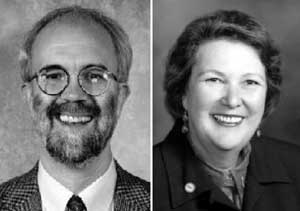-
- Civil unions author lauds California DP bill
- Constitutional marriage amendment debated in U.S. Senate
- Ban predicted in Mass. if high court legalizes gay marriage
- ROTC student loses $40,000 over ‘don’t ask, don’t tell’
- Supreme Court asked to grant custody to lesbians
- Merck testing AIDS vaccine on humans
- Durham first N.C. county to offer same-sex bennies
- University allows antigay web log on school’s server
- National News Briefs
- World News Briefs
national
Civil unions author lauds California DP bill
AB 205 headed for governor’s desk
Published Thursday, 11-Sep-2003 in issue 820
MONTPELIER, Vt. (AP) — Vermont Rep. William Lippert is proud to have helped create Vermont’s first-in-the-nation law recognizing the relationships of gay and lesbian couples.
And now he is happy to have California following Vermont’s lead, even if the bill just adopted stops a little short of where he’d like it to be.
The California Assembly gave final approval last week to a law that would grant gay and lesbian couples nearly all of the rights, benefits and responsibilities of marriage. Gov. Gray Davis has said he would sign it into law.
California’s action is “of tremendous significance for the gay and lesbian population in the country simply by the unique place that California holds in our national politics and in the politics of the national gay and lesbian community,” said Lippert, one of the authors of Vermont’s 2000 law.
Lippert, a Democrat from the Burlington area, believes Vermont helped set the stage for California’s action.
“I think we set a standard of coming so close to marriage that I’d like to think that has helped California go way beyond their initial efforts to simply have a list of certain rights, but not all rights,” Lippert said.
National advocates want to go even further and grant gays and lesbians full marriage rights.
“What occurred in Vermont with civil unions was a giant step forward, but it’s important to understand it’s still a separate legal structure for gay couples and by its nature (is) not equal to marriage,” said David Smith, spokesperson for the Human Rights Campaign. “And the same is true for California.”
Opponents say both seek to undermine families and threaten laws such as defense of marriage acts that exist in 38 states and in the federal government, said Tony Perkins, president of the Family Research Council.
“At some point we’re anticipating that someone’s going to challenge that law,” said Perkins.
Gay and lesbian advocates have been cheered by a series of advances this year, including a U.S. Supreme Court decision striking down anti-sodomy laws, the ordination of an openly gay bishop in the Episcopal Church, and the legalization of gay marriage in Canada. And a ruling is expected from the Supreme Judicial Court in Massachusetts on a lawsuit in which a number of same-sex couples are seeking the right to marry.
“Certainly this has been a remarkable summer of developments,” said Evan Wolfson, who heads the New York-based Freedom to Marry organization.
At the same time, there have been moves in the opposite direction. Perkins testified last week in Washington before a Senate subcommittee looking to strengthen laws that define marriage as the union of a man and a woman. Pope John Paul II issued a directive telling Catholic legislators they have a moral duty to oppose gay marriage. And President Bush reiterated his opposition.
Supporters of the Vermont and California laws disagree with critics who say they have legalized gay marriage.
The chief author of the California bill said legislative strategists made sure their initiative was not marriage and didn’t look like it.
“What we thought was more important was the goal of protecting our families,” said Assemblymember Jackie Goldberg. “We wanted to be a very large state that says (recognizing same-sex relationships) is right before the law.”
Lippert said he was especially pleased that the California bill requires the state to recognize similar laws in other states.
“I think it’s of tremendous significance for our national gay and lesbian community that we would have two jurisdictions offering — in law — mutual recognition,” Lippert said.
There are a couple of key differences between the California and Vermont initiatives.
Couples in Vermont file their state income taxes jointly, as married heterosexual couples do. That provision was deleted in California, in large measure because of the budget mess confronting the state.
Vermont civil unions must be solemnized or certified in a ceremony overseen by a member of the clergy, a judge or a justice of the peace.
That was left out of California’s domestic partnership bill to make clear that the partnership was not intended to be marriage, Goldberg said.
When California’s law goes into effect on Jan. 1, 2005, couples will merely need to file notarized paperwork with the secretary of state, much as they do now under the state’s more limited domestic partnership registry.
“In California, the public makes a distinction between marriage and domestic partnership,” Goldberg said. “They support one and they’re not quite ready as a whole to support the other.”
|
|
Copyright © 2003-2025 Uptown Publications


